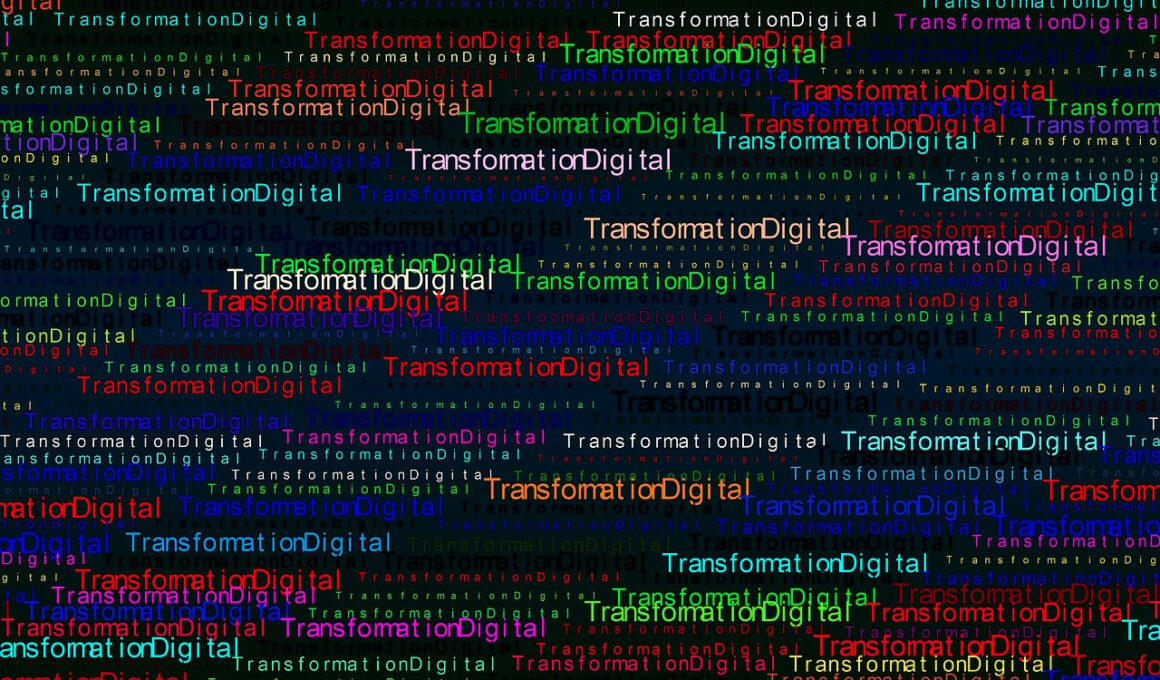Building a Digital-Ready Business Culture
In today’s rapidly evolving business landscape, fostering a digital-ready culture is crucial for survival and growth. Organizations must adapt their strategies to embrace new technologies effectively. A digital-ready culture promotes agility, collaboration, and innovation, allowing companies to respond to market changes promptly. Businesses should prioritize open communication channels, enabling teams to share ideas and feedback seamlessly. This openness can lead to discovering new opportunities and creative solutions. Also, investing in employee training is essential for cultivating a workforce skilled in digital tools and methodologies. Programs that enhance technical skills can significantly empower employees while boosting overall productivity. By establishing clear digital transformation goals, organizations can provide unified direction across all teams. Encouraging a growth mindset among employees helps them embrace change and prioritize continuous learning. Moreover, fostering cross-functional collaboration can streamline processes and enhance decision-making efficiency. When different departments cooperate, they can combine their expertise to innovate and overcome challenges more effectively. Ultimately, cultivating a digital-ready culture positions businesses to thrive in an increasingly digital world, ensuring long-term competitive advantages.
Furthermore, organizational leadership plays a significant role in nurturing a digital-ready business culture. Leaders must exemplify a commitment to digital transformation efforts by actively participating in training and conferences. This involvement not only motivates employees but also demonstrates the organization’s dedication to change. By highlighting successful digital initiatives, leaders can inspire their teams and build enthusiasm for adopting technology. Additionally, it’s essential for leaders to set realistic timelines and measurable outcomes for digital transformation. This accountability fosters a sense of ownership among team members, encouraging them to contribute meaningfully to the process. Emphasizing the importance of data-driven decision-making can significantly enhance the organization’s operational efficiency. Encouraging teams to rely on analytics helps reduce guesswork and promotes informed strategies. Establishing internal digital champions can further accelerate transformation efforts. These individuals can facilitate workshops, share knowledge, and encourage their peers to experiment with new technologies. Implementing feedback loops allows organizations to refine their approaches continuously. Listening to employees’ insights and experiences can provide valuable information for improving digital initiatives. This collaborative approach creates an environment where everyone feels involved and invested in the company’s journey toward digital maturity.
Technology Implementation
Moreover, effective technology implementation is paramount in building a digital-ready business culture. Organizations need to choose essential tools that align with their strategic goals and facilitate ongoing communication. For instance, integrating project management software can enhance coordination among teams, enabling them to track progress and share knowledge easily. Selecting user-friendly platforms ensures that employees remain engaged and willing to adopt new technologies. Companies should also prioritize cybersecurity measures to protect sensitive data during the digital transformation process. Ensuring robust security protocols builds trust among employees and clients alike. Regular training sessions on digital tools and cybersecurity practices further amplify employees’ confidence in using new systems. After successful implementation, it’s crucial to monitor and evaluate technology usage continuously. Identifying challenges early enables organizations to adjust their strategies effectively, maintaining momentum in their digital transformation journey. Additionally, obtaining employee feedback regarding these tools can lead to improved functionalities tailored to their needs. Organizations should also stay updated on emerging technologies that can drive future innovations. Investing in research and development can unveil new opportunities for enhancing operational capabilities through technology.
Furthermore, enhancing employee engagement is vital in establishing a digital-ready culture. A motivated workforce can drive innovation and adapt more quickly to changes in technology. Initiatives that acknowledge employee contributions, such as rewards or recognition programs, can significantly boost morale. Engaging employees in the decision-making process fosters a sense of belonging and ownership. It encourages them to actively contribute to the organization’s digital transformation efforts. Conducting regular surveys can help gauge employee sentiment and identify areas needing improvement. Tailoring change management strategies to address employees’ concerns can reduce resistance and increase acceptance of new technologies. It’s essential to create a culture of experimentation where employees feel encouraged to test new ideas and approaches. Supporting pilot programs enables teams to explore innovations without the fear of failure. Documenting learning experiences from these trials can produce valuable insights for broader initiatives. Various forums, such as town hall meetings or brainstorming sessions, can facilitate discussions about digital trends and their implications for employees. When employees feel supported during these transitions, they are more likely to embrace new technologies, ultimately benefiting the entire organization.
Leadership Development
Investing in leadership development is another critical component of building a digital-ready business culture. Companies should equip current and future leaders with skills to navigate digital transformation effectively. Leadership training programs focused on digital literacy can empower executives to make informed decisions in increasingly complex environments. Establishing mentorship opportunities allows emerging leaders to learn from seasoned professionals experienced in digital initiatives. This guidance fosters a deeper understanding of the challenges inherent in digital transformations. Organizations can also encourage leaders to connect with industry peers through networking events and conferences. These engagements can provide insights into best practices and innovative strategies. Additionally, leadership development programs must emphasize the importance of emotional intelligence. Leaders who can empathize with their teams can create more inclusive environments where employees feel valued and understood. As a result, employees are more likely to engage actively in digital transformation efforts. Furthermore, organizations should regularly assess the effectiveness of leadership development initiatives. Gathering feedback allows organizations to refine programs continually based on real-time needs. By prioritizing leadership development, companies can ensure that their leaders are well-equipped to guide teams through digital transitions and drive sustainable change.
Another vital aspect of crafting a digital-ready business culture involves promoting an ethos of continuous improvement. Companies should encourage employees to actively seek out opportunities for optimization and innovation in their workflows. Implementing practices such as sprint retrospectives can ensure that teams learn from their experiences, recognizing both successes and areas for improvement. Establishing clear key performance indicators (KPIs) enables organizations to track progress consistently. Sharing these metrics transparently can keep everyone aligned and motivated toward common goals. Additionally, organizing hackathons or innovation challenges can stimulate creative thinking and collaboration across departments. These events can serve as a launchpad for groundbreaking ideas that bolster digital initiatives. It is also essential for organizations to embrace failure as a part of the learning process. Celebrating well-intentioned attempts, regardless of the outcome, fosters a culture where employees feel safe to try new things. This mindset can significantly enhance creativity in problem-solving and drive successful outcomes. Companies should champion a culture of knowledge-sharing, encouraging teams to document and share lessons learned. By integrating improvement into everyday practices, organizations can catalyze ongoing digital transformation and position themselves competitively.
Conclusion and Future Outlook
In conclusion, building a digital-ready business culture is essential for organizations. The blend of leadership commitment, employee engagement, and continuous improvement creates a fertile environment for digital transformation. Companies must invest in training, technology, and leadership development to facilitate this shift effectively. Emphasizing collaboration, data-driven decisions, and open communication fosters agility and innovation. Integrating employee feedback ensures initiatives align with their needs, ultimately enhancing engagement and motivation. As businesses navigate through digital advancements, they must remain adaptable. This adaptability is key to overcoming challenges and seizing opportunities for growth. Continuous evaluation of strategies and technology ensures that organizations stay ahead of industry trends and meet evolving customer expectations. By creating an organizational culture rooted in adaptability, companies can effectively prepare themselves for emerging technologies. The future demands businesses that not only understand digital transformations but can also implement them strategically. As we progress, organizations that prioritize a digital-ready culture will thrive in an increasingly competitive landscape. By embracing these principles, businesses can secure a sustainable future in the ever-changing digital economy.


